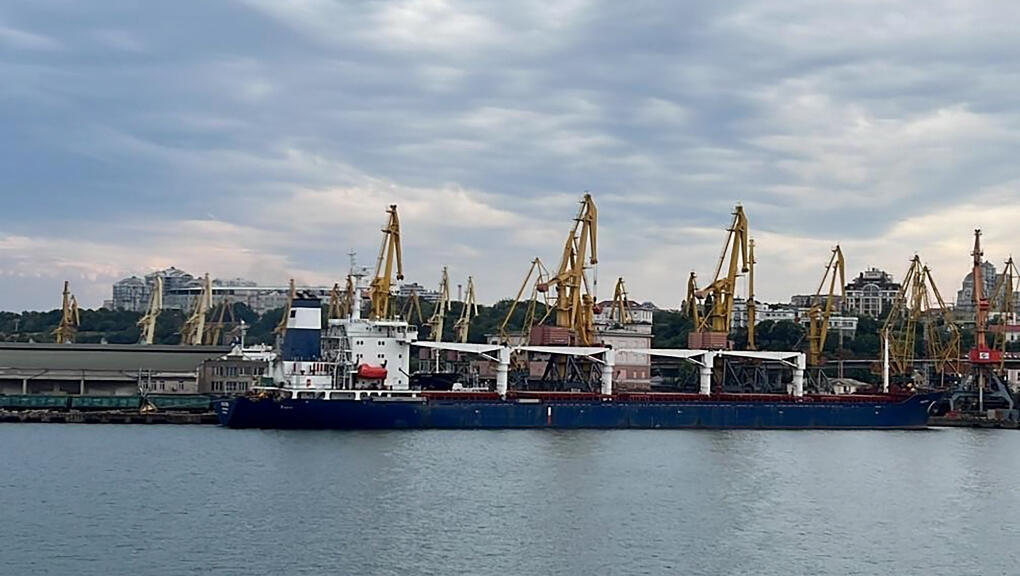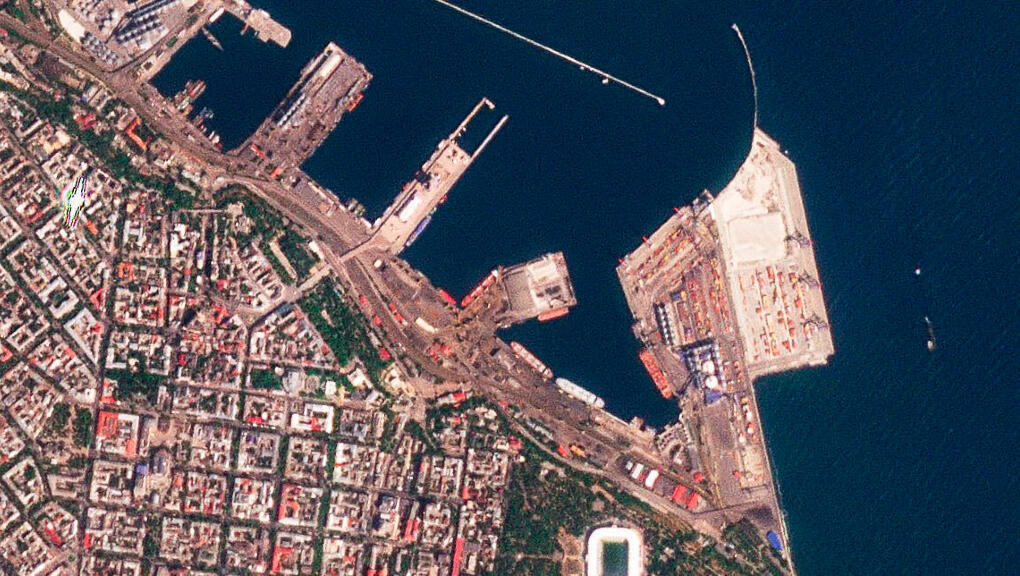For the first time since Russia started the war, Ukraine resumes its grain exports this Monday, August 1, in accordance with the agreement reached with Russia in Istanbul that seeks to alleviate the world food crisis. The first ship is loaded with 26,000 tons of corn and its destination is the port of Tripoli, in Lebanon. The grain shipments come as fighting intensifies in parts of Ukraine.
The 26,000 tons of corn is the first shipment of dammed grain to leave Ukraine since the start of the war five months ago.
The first merchant ship to resume exports left this Monday, August 1 under a safe passage agreement, under international supervision, agreed on July 22 in Istanbul between representatives of Ukraine, Russia, Turkey and the United Nations and which is expected to , help alleviate the global food crisis.
“The ship ‘Razoni’ set sail from the port of Odessa bound for the port of Tripoli, in Lebanon. It is expected to arrive in Istanbul (at the entrance to the Bosphorus) on August 2. It will continue its route to its destination after the inspections that will be carried out” in Turkey, announced Turkish Defense Minister Hulusi Akar.

In an interview with Turkey’s state-run Anadolu agency, Akar warned that the global food crisis threatened to trigger “a serious wave of migration from Africa to Europe and Turkey.”
For his part, the Ukrainian Minister of Infrastructure, Oleksandr Kubrakov, explained that a Sierra Leone-flagged ship is in charge of transporting the first tons of grain through the Black Sea since the Russian invasion.
“The first grain ship since the Russian aggression has left the port,” the minister confirmed on Twitter, posting a video of the long vessel clanking as it slowly headed out to sea.
In his Facebook account, Kubrakov recalled that Ukraine is the fourth largest exporter of corn in the world, “so the possibility of exporting it through ports is a colossal success in ensuring global food security.”
16 more ships, all blockaded since the beginning of the full-scale invasion, are waiting their turn in the ports of Odessa.
Kubrakov added that the shipments would also help Ukraine’s war-torn economy. “Unlocking the ports will provide at least $1 billion in foreign exchange earnings to the economy and an opportunity for the agricultural sector to plan for the year ahead.”
Within what was signed 10 days ago, it is also contemplated to guarantee Moscow the export of its agricultural products and fertilizers, despite Western sanctions.
In Moscow, Kremlin spokesman Dmitry Peskov called the ship’s departure “very positive,” saying it would help test the “efficiency of the mechanisms that were agreed upon during talks in Istanbul.”
Lebanon hopes to ease its food crisis
Between 20 and 25 million tons of grain have been blocked in Ukrainian ports since the beginning of the invasion on February 24, which has sent prices soaring. Russia and Ukraine are major agricultural powers, and their wheat, corn and sunflowers, in particular, supply the world market.
The corn is heading to Lebanon, a country where an explosion on August 4, 2020 in its main port of Beirut destroyed its capital and destroyed grain silos, a part of which collapsed this Sunday after two weeks of a fire in the most damaged site of the silos.
The Middle Eastern nation is suffering from one of the world’s worst financial crises in more than 150 years, as described by the World Bank. Hence, this first shipment is expected to alleviate its internal crisis.
The country mainly imports wheat from Ukraine, but also buys corn to make cooking oil and to produce animal feed.
Ukrainian Foreign Minister Dmitro Kuleba has called the day “a day of relief for the world, especially our friends from the Middle East, Asia and Africa, when the first Ukrainian grains leave Odessa after months of Russian blockade.” .

Meanwhile, the UN Secretary General, António Guterres, applauded the resumption of exports and said he hoped that other commercial ships could set sail and provide “the indispensable stability and assistance to world food security, especially in the most fragile humanitarian contexts”.
Odessa residents with mixed feelings
Odessa residents reacted with mixed feelings when the first ship set sail. Olena Vitalievna, a resident of the port, noted that she was pleased to hear the ship’s whistle for the first time. “Finally, life starts to move on and there are some changes in a positive direction,” she said.
However, other residents are more skeptical, with concerns about Russia’s response. “Usually, it is not clear what to expect from the aggressor country,” said another woman who gave only her name, Taisia, adding that she was worried because she had friends on board the ship that set sail.
However, the resumption of grain shipments comes as fighting intensifies elsewhere in Ukraine. The presidential office in kyiv reported that at least three civilians were killed and 16 others wounded by Russian shelling in the Donetsk region in the past 24 hours.
Donetsk Governor Pavlo Kyrylenko again called on all residents to evacuate, stressing the need to remove some 52,000 children still left in the region.

Shortly after the grain shipment agreement was signed on July 22, a Russian missile targeted Odessa. Analysts warned that continued fighting could threaten the grain deal.
“The danger remains: the Odessa region has been facing constant bombardment and only regular supplies could test the viability of the agreements signed,” said Volodymyr Sidenko, a member of the kyiv-based think tank Razumkov Center.
“The departure of the first ship does not solve the food crisis, it is only the first step that could also be the last if Russia decides to continue the attacks in the south,” Sidenko said.
With AFP and AP








![[Img #74675]](https://thelatestnews.world/wp-content/uploads/2024/12/They-discover-a-new-class-of-X-ray-sources-in-the-150x150.jpg)



Add Comment